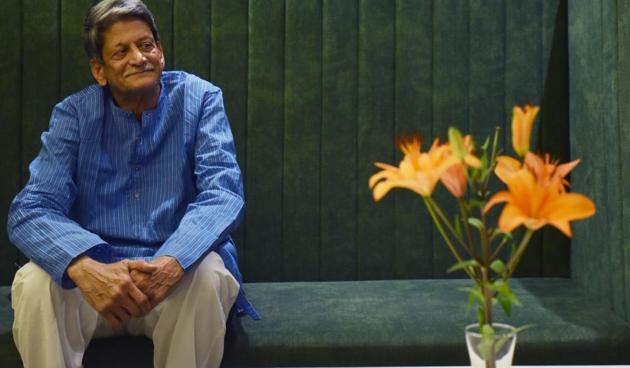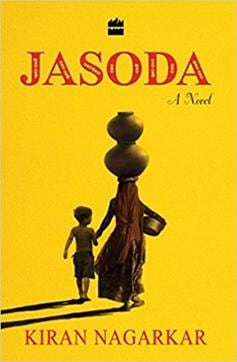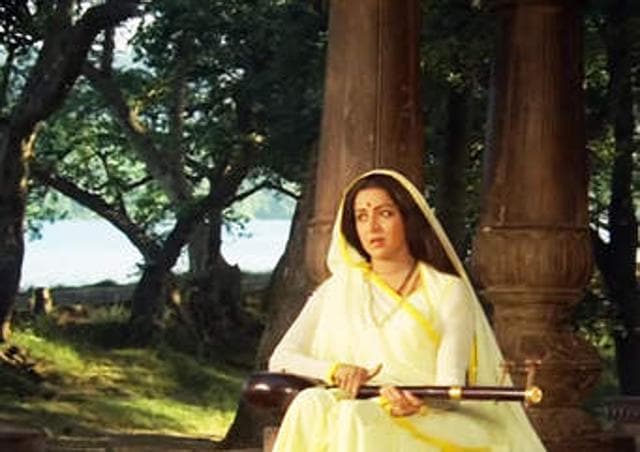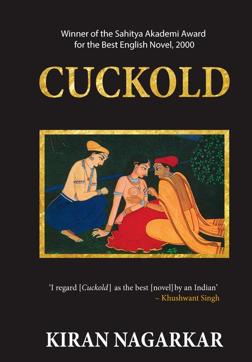My Meerabai isn’t a cluster of cliches says Kiran Nagarkar of his Cuckold heroine on the book’s 21st anniversary
Author Kiran Nagarkar’s novel Cuckold missed the Booker but won the Sahitya Akademi award
Kiran Nagarkar is perhaps the only prominent Indian author writing in English to have begun his literary career in his mother tongue, Marathi. He is best known for his novel Cuckold (1997), a work whose initial lukewarm reception, was eventually hailed as a landmark in Indo-Anglian fiction.

Your first novel Saat Sakkam Trechalis, (republished in English as Seven Sixes are Forty Three) was written in Marathi and yet you switched to English completely.after this book.
The truth is, it was what I now like to call a totally unexpected but happy accident. I had given up Marathi after the first four years of primary school. My father who was in the railways decided to move my mother, brother and me from Mumbai to Pune because of my health. I have no idea why he chose to put me in a Catholic school where the medium of instruction was English. When we came back to Bombay, I got admission in Don Bosco High School and that meant that my entire education continued to be in English till the time I finished my Masters.
English was the language of privilege and subconsciously as I grew up I must have realised it gave one special advantages and status. After passing my SSC exams, I joined St Xaviers College where I was a phenomenal misfit. I felt totally out of place. I wore my brother’s trousers which did not reach to my ankles, to college. The women in Xaviers were all houris and the young men came in chauffeured cars. I was out of my depth and I broke all kinds of records. I plugged every single subject in the first year terminals except moral science which must have taken some doing. I did even better in finals .... I was so ill I could not appear for the exams.
Do take us to the time when you wrote your first ‘literary’ sentence.
I came to know Dilip Chitre who was a leading Marathi poet, novelist and critic of the post-independence era and one of the founders of the Sathottari little magazine movement in Maharashtra. His father used to publish the Marathi highly influential periodical Abhiruchi. Dilip informed me that his dad had asked him to edit the next issue. I came back home that night and wrote my first story, That Man, in Marathi.
Why I moved back to my mother tongue will always be a mystery to me. Looking back, that story seems to reflect some of my ambivalent ideas about human beings and their relationship with God.
The protagonist is a guy called Toh. The folks around him find him a pain in the butt, and people try to get rid of him but he refuses to die. Is Toh the symbol of man’s insatiable curiosity and the spirit of enquiry? They appeal to God to get rid of him. In that story, God is like an Air India maharaja sitting on a throne but his feet do not quite touch the ground. God is patient and ignores the complaints against Toh and asks him to lie down on the floor. Now for the first time God’s feet reach the floor. The night after I wrote that story, I started on my novel Saat Sakkam Trechalis in Marathi. If I had thought a minute about what I was doing, I would never have started writing it.
So similarly when you started writing in English, it wasn’t a conscious decision. English for you also is not the language of a colonial hangover.
Kiran Nagarkar is very lucky to know what his roots are. I am neither this or that. My roots are hybrid. I’m a half-baked person and that is never going to change. I wrote Saat Sakkam Trechalis (1974) and a play Bedtime Story (1978) in Marathi. But I also imagined and wrote the Ravan and Eddie (1995) trilogy and Cuckold (1997) and other books in English.
Your play, Bedtime Story, partly based on the Mahabharata got you into trouble. Your Draupadi, one of your first striking women characters, does not move along expected tracks.
For a 74-page play to have 78 cuts, some of them full page, didn’t make any sense to me. Like most Censor Boards, the one in Maharashtra loves the power to say ‘no’. That play was about the idea that anything that occurs anywhere in the world, whether in Iraq, Puerto Rico, or in our backyards, you and me are responsible for it. I used four stories from the Mahabharata to make my point. I don’t believe that the Pandavas alone were the good guys and the Kauravas the bad ones. The character who plays Draupadi plays Gandhari too. In one scene she gives a earful to her mother-in-law, Kunti.
To Yudhishtir, the eldest Pandava who is universally considered Mr Right and the moral centre of the epic, she says ‘If you want to sleep with me, at least have the honesty to say so. Maybe then I might just consider it.’ As far as possible I have not repeated characters or done the same sort of book again. My Jasoda [also the title of his new book] is not like Draupadi and Draupadi is not like Meerabai.

How did you think of making Bhoj Raj the centre of your novel Cuckold, a tale set in 16th century Rajasthan in the house of Rana Kumbha?
It occurred to me one late night that the legendary Meera was a puzzle. She is perhaps one of India’s most famous women, or at least the most well-known woman saint. Even the South delights in her; MS Subbulakshmi has sung her bhajans. Her words are on everyone’s lips, cinema sings her songs and praises but her husband, the great grandson of Rana Kumbha, is a black hole. He has been completely erased from memory.
To put it mildly, I don’t think I cared much for Meerabai. She was just a non-stop cluster of cliches in the public imagination. You also have the Amar Chitra Katha version of her history, a hash of history more like it. In its version, Emperor Akbar gives Meerabai a pearl necklace when in reality they had never met. She predated Akbar and so there was no chance of their meeting.
How were the reviews?
Cuckold took a long time to take off. The reviews over the next few months were very strong and positive but the book died almost instantaneously. One of the most laudatory by [poet and professor] Makarand Paranjype ended with the statement that the only problem with the book was the translation of Meerabai’s poems. The fact of the matter was that I wasn’t translating them at all. I wrote those verses myself which is why a very different persona develops for Meera. While they are important verses in the context of Meera’s persona, I am well aware that I’m not a poet.
Seen the sun today?/ It’s gone peacock blue./Looked at my tongue this morning./Same thing. Stark blue./Blue marigolds. Blue ravens. Blue grass./Must be a blue cataract in my eye, I said./ Glanced, by chance at the calendar then./…Wish you a true blue birthday, my love./Can gods have birthdays,/Thought they were without beginning or end.

The Meera we know, from her verses and film songs, on the other hand is someone who is absolutely crazy about Krishna and she is willing to take the secondary role. In my verses she is an independent-minded woman with a sense of humour and who is not limited by the fact that she belongs to the so-called weaker sex. This is not the Meerabai we have been handed down over the centuries.
Ask him to come fast / I’m about to breathe my last / Nothing serious really / Just a routine heart attack / Tell him I died / With one eye open…If he won’t come soon,/ Let him come late,/I’ll wait./ If it makes him Feel important/ To be inconstant/ Why, of course / I’ll indulge him./ Because Giridhar / Lover / Move over / I’ve got another.
I believe you did not, at first, like the label ‘historical novel’ being applied for Cuckold. Yet, they are all people of history. What did you think you were writing?
Caught again as Dylan Thomas would say. I was so involved with that novel, I was certain I was writing a contemporary novel. And so it never occurred to me that I was writing about the past.
Cuckold is also a political novel. It’s about who should lead, who is fit to lead, at what moment a leader can rise, that power is about being measured and not rush around flashing one’s sword.
True. In the beginning the Maharaj Kumar, Bhoj Raj is a conundrum as he sends 10,000 of the enemy soldiers from Gujarat to their death in the quicksands. What we learn in time is that he is perhaps one of the finest students of the Gita and the Gita god. Which is why he doesn’t subscribe to the warrior code of the Rajputs – that you must never be defeated even if you are wiped out in the process. As far as possible he does not want to sacrifice even a single soldier of his. The Maharaj Kumar is a thinker and a deeply introspective person. He’s not above deceit when fighting with his enemy and prefers to fight when the chances of winning are good. Valour has little meaning for him. Life is precious and he is willing to break rules to preserve it.

Many consider Cuckold the best Indian novel in English not to have won the Booker. Yet it wins the Sahitya Akademi award.
How long will we keep saying that if the West approves, or if the West offers 500,000 dollars for a book it must be good and if a million, then it must be twice as good. We had such a fine and unerring eye for analyses and critical insights in ancient times as seen in the Upanishads, Panini’s grammar and Vatsayan’s Kamasutra. Today we seem to take all our cues from the West instead of developing a robust and rigorous spirit of questioning and developing our own critical tradition. For instance why do we call Bhishma Pitamaha? Yes, he did make great personal sacrifices but during Draupadi’s vastraharan did he utter a word? Did he raise his voice and tell the Kauravas that they were the guilty party and had no business to go to war?
Why don’t we enquire and grasp what a great man Eklavya was? He was a self-made man. He had no access to the greatest teacher of his times. He took Drona as his symbolic teacher and became a far greater archer than Arjun. And what did he get in return? Dronacharys shamelessly demands his right thumb so that his own pupil Arjun would be regarded as the finest archer in the world.
An interesting thing in the novel is that Krishna is turned into a family deity when the house of Mewar considers itself as a descendant of the Sun god and Shiv or Eklingji is the family deity.
That is the source of the palpable tension in the book. The Princess (Meerabai) not only disowns her conjugal duties but commits herself to a god who is not the keeper of the family honour. That is where Bhoj Raj emerges as a supreme thinker and politician. Krishna should be his enemy since his wife is carrying on with him, but he grasps the importance of the teachings of this enemy. He understands the wisdom of something that his one time teacher, none other than the Flautist has taught him and which most Rajputs can’t fathom: retreat is not defeat or loss. Retreat is nothing but a golden vehicle to buy time and advantage to do better the next time and defeat the enemy.
What is the story of your new book, Jasoda?
It is, I think, an unflinching look at women whose heroic struggles go mostly unnoticed and unrecognized. In this particular case it is the story of a rural woman and her children in a drought-stricken place.
Who are the Indian writers you read?
I liked Amitav Ghosh’s Shadow Lines. Vivek Shanbhag’s Ghachar Ghochar is a remarkable understated story and he tells it with such wonderful economy. I think Nayantara Sehgal’s new novella When the Moon shines by Day is an amazingly insightful work. How she pulls it off in such a brief format tells you what an inventive and terrific writer she is.
I also keep going back to Graham Greene. Recently I chanced upon a book i had read decades ago --Mr Norris Changes Trains, [a 1935 novel by the British writer Christopher Isherwood]. It captures the last days of the Weimar republic against the background of Hitler rising to power. It is nothing short of brilliant.
Have you ever been approached to turn Cuckold into a film?
The most recent offer came a few days ago. Bollywood directors approach you and then ditch you. I think it would make a great series or movie. Shabana would be terrific as Rani Karmavati [the scheming step-mother of Bhoj Raj]. As to Meerabai .... as you can see I am getting carried away.
Are you getting to pick the actors?
I’m sure I won’t get to pick anything, not even the story-line if one of my books was to be made into a film. But I wish some of my books could be turned into audio-books. I could read Ravan and Eddie or Cuckold for the visually impaired or anyone who prefers to listen to books rather than read them.
What are you working on next?
There is no book till it is published .... unless you are living in fantasy land. As you perhaps know I own 100% rights to this property and can tell you I am working on seven, beg your pardon, seventy-seven classics, each one of them Nobel-Prize winning.




